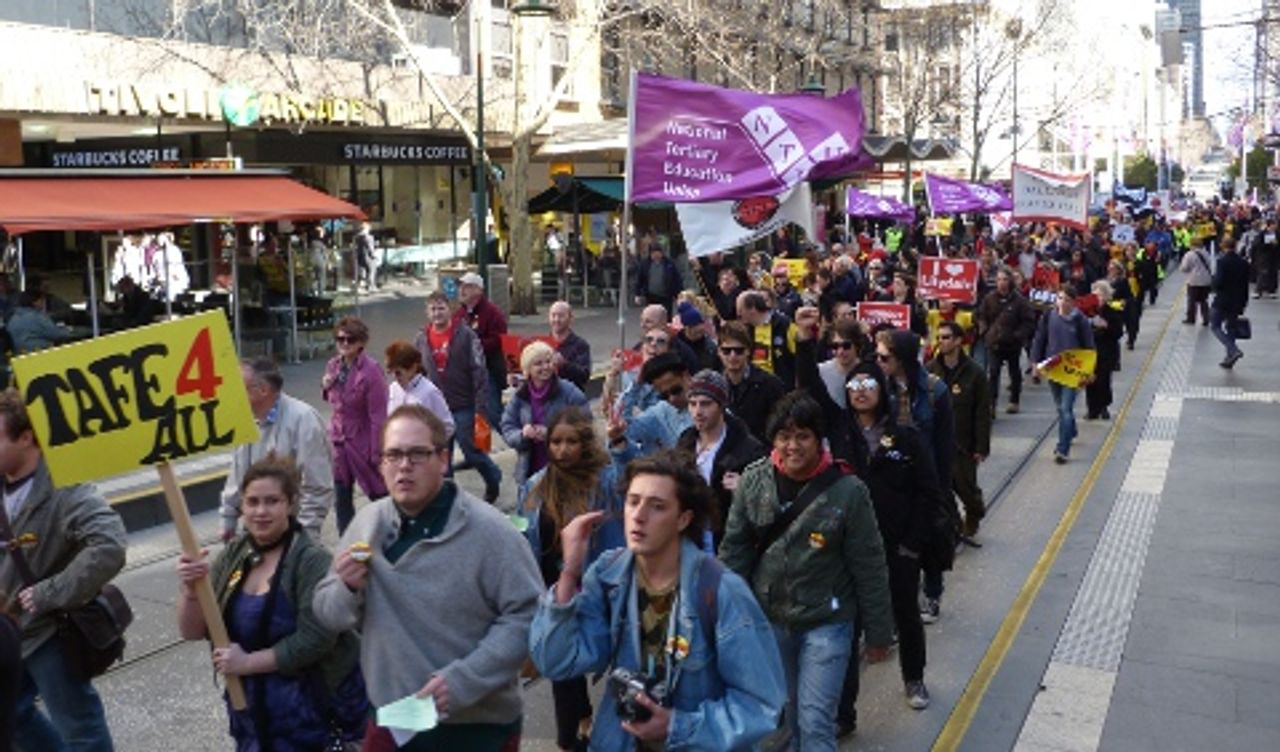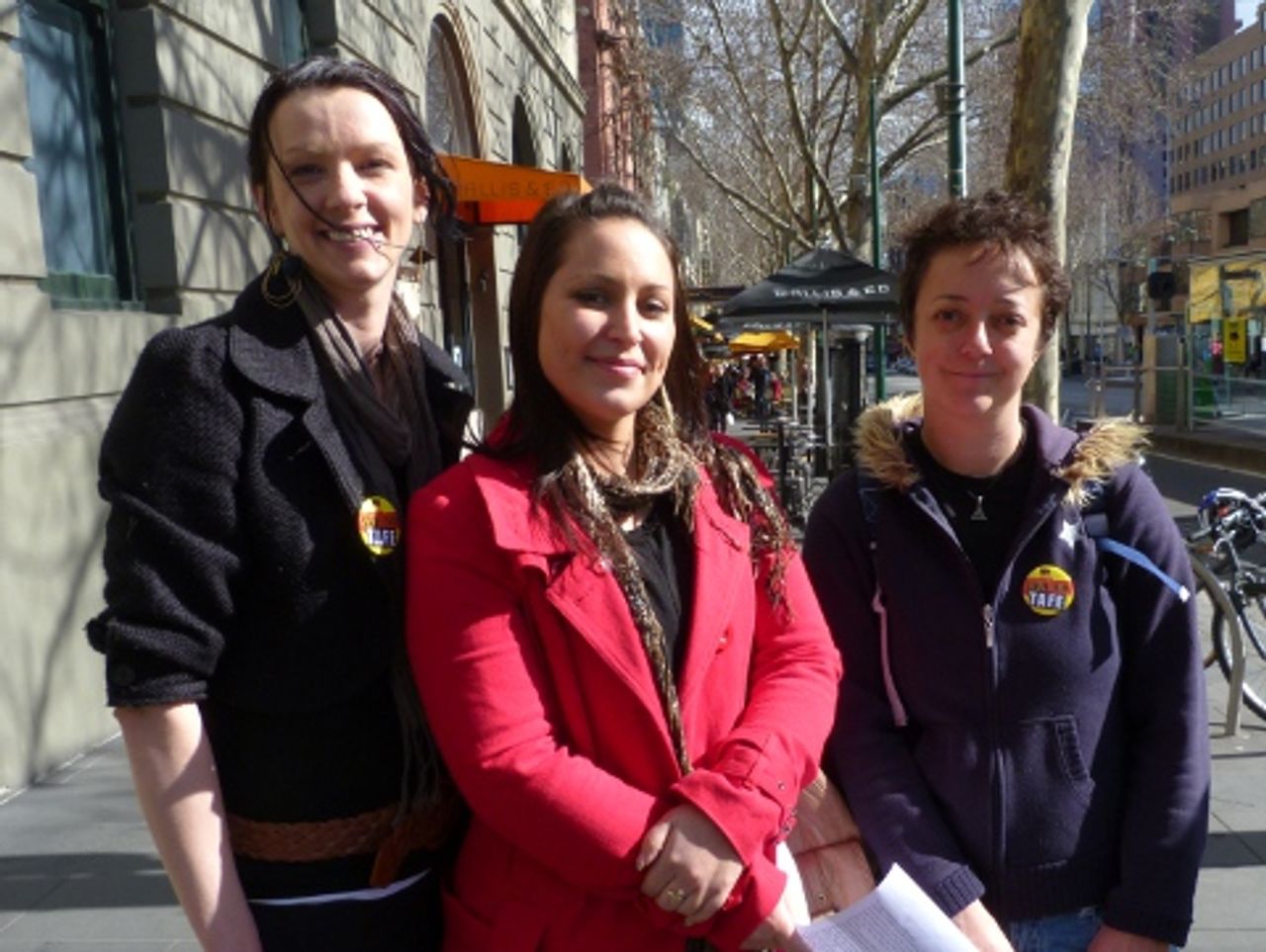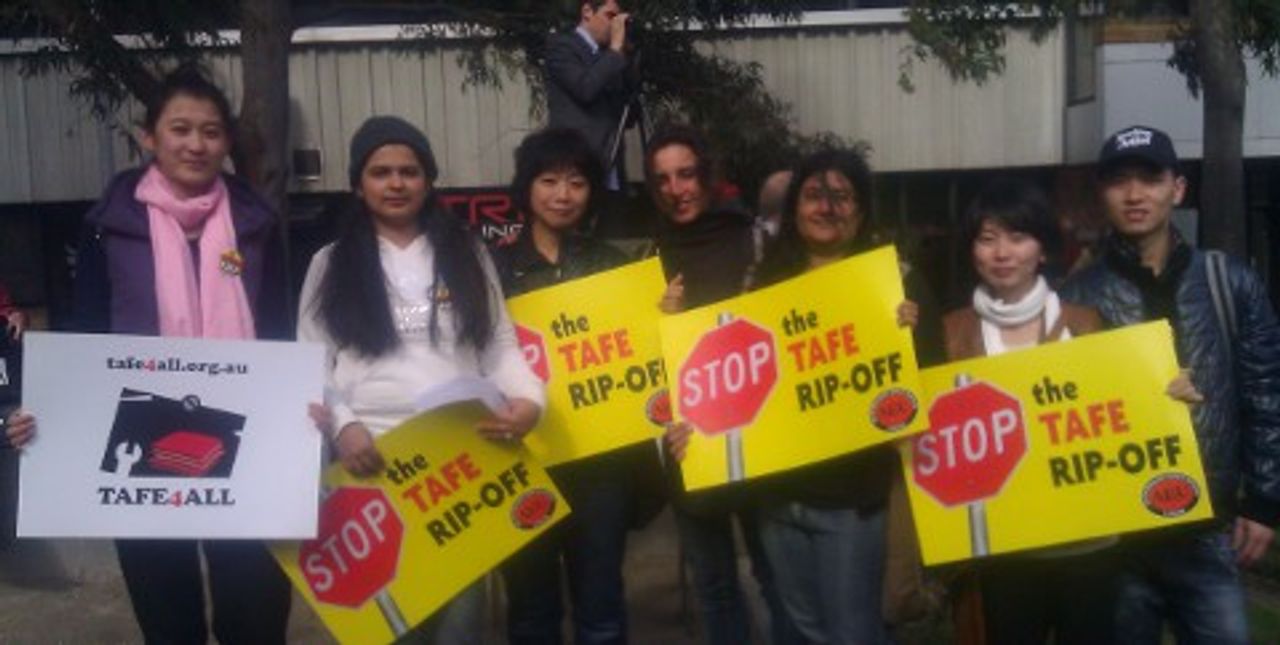More than 2,000 Technical and Further Education (TAFE) staff and students marched in Melbourne yesterday against severe funding and job cuts being imposed by the state government of Victoria.
The midday rally, organised by the Australian Education Union (AEU) and National Tertiary Education Union (NTEU), began outside the State Library of Victoria in Melbourne’s central business district. Main roads were closed off as the demonstration marched to the state parliament.
 Students and staff march to the state parliament
Students and staff march to the state parliament Underscoring the widespread hostility to the cuts, TAFE workers from throughout the state travelled to the city, even though the unions did not call a strike on the day. They joined students and staff from Swinburne University of Technology, as well as Victoria University and RMIT University, which have TAFE sectors. Some secondary school students also attended.
Premier Ted Baillieu’s Liberal government announced cuts of more than $300 million per year to the TAFE system in its May budget. These cutbacks will have a devastating impact, ensuring the destruction of jobs, the elimination of courses and the further opening up to private providers.
Already, 550 jobs are slated to go, with another 1,450 expected by the end of the year. Entire courses are to be eliminated, as well as funding for libraries, learning centres and counselling services. Some students face a quadrupling of their course fees, from $2,000 to $8,000 per year.
The central thrust of the rally, however, was to cover up the fact that the Baillieu government is implementing the program of the federal Labor government. Prime Minister Julia Gillard’s Vocational and Further Education scheme has established a national “contestable market” which undercuts the TAFE system by favouring commercial operators that invest in the most profitable courses. The state budget cuts are also in line with the Gillard government’s pledge to the financial markets to deliver budget surpluses by slashing public spending.
The Baillieu government is, moreover, expanding upon the measures initiated by the former state Labor government of Premier John Brumby, which pioneered the “contestable market” program now being enforced nationally by Gillard. Brumby’s “reforms” resulted in TAFE’s share of enrolled technical students plummet from 75 percent in 2007 to 48 percent in 2011.
At the rally, none of the speakers referred to the international assault on education and the conditions of youth, including in Europe, the United States, Chile and Canada, where students have waged a six-month strike against fee hikes and funding cuts.
The education unions sought to channel the anger of teachers and students behind a re-election campaign for a Labor government that will only deepen the assault on TAFE and public education as a whole. The AEU and NTEU invited state Labor opposition leader Daniel Andrews to address the rally and accept anti-cuts petitions they had collected.
Andrews refused to pledge that a Labor government would reverse the TAFE cuts. Instead, he stated: “I’ll have more to say about what we’ll do as an alternative, and I hope that will be a policy position that you’ll be able to strongly support.”
AEU president Mary Bluett claimed the cuts were simply “bad policy”, while NTEU Victorian secretary Colin Long urged the rally to “get rid of this bad government.” Union officials chanted demagogic anti-Liberal slogans over megaphones during the march, including, “Save TAFE, Sack Ted.”
No union speaker even mentioned the Gillard government, which is conducting an offensive against teachers and public education at every level—schools, universities and technical colleges.
However, there were signs of hostility to Labor’s pro-business record. A number of people heckled Andrews during his speech. One shouted: “What are you doing here? You started this.”
A Socialist Equality Party (SEP) campaign team distributed a World Socialist Web Site leaflet outlining the need for a political struggle against the Labor government and the unions that enforce its program, as part of the fight for a workers’ government based on socialist policies.
SEP campaigners spoke to students and teachers.
Shonalee Campbell, Jessica Maia and Christina Bauer are studying for the Diploma of Community Services and Community Development at Kangan TAFE, in the working class Melbourne suburb of Broadmeadows.
 Kangan TAFE students (left to right) Shonalee Campbell, Jessica Maia and Christina Bauer
Kangan TAFE students (left to right) Shonalee Campbell, Jessica Maia and Christina BauerAsked about the Labor Party’s responsibility for the TAFE cuts, Bauer said: “I felt that [opposition leader] Andrews saying that his policy was to find alternatives was—excuse my language—BS, because I don’t agree with ‘alternatives’. Just stop the cuts.
“I don’t know most of the background history with Labor,” the young student continued. “I did hear a lot of the audience members saying, ‘You’re the one who started it. Get off the stage!’ That’s the first I heard of it.”
Campbell described the impact of the cuts: “Because we’re in the Broadmeadows area we have a lot of disadvantaged people, and a lot of them are going to be shut out of the system. They are not able to go to university yet, so TAFE was kind of a stepping stone for a lot of them.
“We’ve got a lot of single parents and a lot of multiculturalism—so it is going to affect who can and who can’t apply. Even last year it was affecting enrolment. Look at us—we’ll have no future, and no way of providing for our families.”
Bauer added: “With higher fees, more students won’t enrol. It won’t be an option for them.”
A bricklaying and business development teacher from the regional town of Geelong, commented: “The guts have been slowly coming out of TAFE every year. A lot of important courses are not being funded under this current system.”
He added: “The previous [Labor] government uncapped funding. Private RTOs [Registered Training Organisations] are snapping it up left right and centre. It’s left all the TAFEs in a position where they can’t compete against the private RTOs.”
A group of students from the North Melbourne Institute of Technology in Preston are studying English as a second language and employment pathways.
 International students from the North Melbourne Institute of Technology in Preston
International students from the North Melbourne Institute of Technology in PrestonShvete Chanda explained: “After 15 weeks—or 510 hours—of our course, if we need to continue with our studies, if we need more training, then we have to pay. We don’t have jobs, so we can’t pay for the courses. We need to know the society and culture in order to get a job. I’ve had so many interviews … unsuccessful, unsuccessful, unsuccessful. I did my best to get a job.”
Luna Peng added: “My husband is going to university at VU [Victoria University], doing hospitality management. The teachers are great, but they are losing them. On Monday the students arrived, but there was no teacher there to teach the course. All the students were waiting around. Nobody came to tell them anything. They were waiting all day, but there was no teacher.”
Rob, a teacher at the North Melbourne Institute of TAFE in the Advanced Diploma in Media, said: “The effect of the cuts would result in us cutting our teaching budget down, something between 4 and 10 percent, but we really don’t know. It’s still unclear. There will be cuts now, but the major cuts will happen at the start of next year.
“What’s frustrating for us is that we have a number of degree programs available, two-year degrees, and each year the fees get higher. The new students that come in will have much higher fees and many students will be unable to pay them.”
Rob, who has been in the TAFE system since 1988, commented: “These cuts started happening under [Premier John] Brumby. The introduction of the private institutions under Brumby started this whole ball rolling, where any type of dodgy provider can set up, charge whatever fees and students may not even be properly trained. This undermines everything that we do in the TAFE system.”
Subscribe to the IWA-RFC Newsletter
Get email updates on workers’ struggles and a global perspective from the International Workers Alliance of Rank-and-File Committees.
